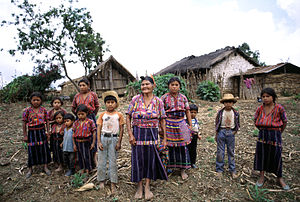
There is no generally accepted definition of Indigenous peoples,[a][1][2][3] although in the 21st century the focus has been on self-identification, cultural difference from other groups in a state, a special relationship with their traditional territory, and an experience of subjugation and discrimination under a dominant cultural model.[4]
Estimates of the population of Indigenous peoples range from 250 million to 600 million.[5] There are some 5,000 distinct Indigenous peoples spread across every inhabited climate zone and inhabited continent of the world.[6][7] Most Indigenous peoples are in a minority in the state or traditional territory they inhabit and have experienced domination by other groups, especially non-Indigenous peoples.[8][9] Although many Indigenous peoples have experienced colonization by settlers from European nations,[10] Indigenous identity is not determined by Western colonization.[4]
The rights of Indigenous peoples are outlined in national legislation, treaties and international law. The 1989 International Labour Organization (ILO) Convention on Indigenous and Tribal Peoples protects Indigenous peoples from discrimination and specifies their rights to development, customary laws, lands, territories and resources, employment, education and health.[11] In 2007, the United Nations (UN) adopted a Declaration on the Rights of Indigenous Peoples including their rights to self-determination and to protect their cultures, identities, languages, ceremonies, and access to employment, health, education and natural resources.[12]
Indigenous peoples continue to face threats to their sovereignty, economic well-being, languages, cultural heritage, and access to the resources on which their cultures depend.[13] In the 21st century, Indigenous groups and advocates for Indigenous peoples have highlighted numerous apparent violations of the rights of Indigenous peoples.
Cite error: There are <ref group=lower-alpha> tags or {{efn}} templates on this page, but the references will not show without a {{reflist|group=lower-alpha}} template or {{notelist}} template (see the help page).
- ^ United Nations Human Rights, Office of the High Commissioner (2013). "Indigenous Peoples and the United Nations Human Rights System, Fact Sheet No. 9/Rev.2". United Nations. p. 2. Retrieved 29 December 2023.
- ^ "Indigenous and Tribal People's Rights Over Their Ancestral Lands and Natural Resources". cidh.org. Archived from the original on 1 June 2020. Retrieved 30 May 2020.
- ^ McIntosh, Ian (September 2000). "Are there Indigenous Peoples in Asia?". Cultural Survival Quarterly Magazine. Archived from the original on 22 April 2021. Retrieved 1 April 2021.
- ^ a b Secretariat of the Permanent Forum on Indigenous Issues 2009, p. 6.
- ^ Muckle, Robert J. (2012). Indigenous Peoples of North America: A Concise Anthropological Overview. University of Toronto Press. p. 18. ISBN 978-1-4426-0416-2.
- ^ "Indigenous Peoples and the United Nations Human Rights System" (PDF). United Nations. p. 2. Retrieved 21 May 2023.
- ^ Acharya, Deepak and Shrivastava Anshu (2008): Indigenous Herbal Medicines: Tribal Formulations and Traditional Herbal Practices, Aavishkar Publishers Distributor, Jaipur, India. ISBN 978-81-7910-252-7. p. 440
- ^ UNHR Fact Sheet No. 9 2013, p. 3.
- ^ Taylor Saito, Natsu (2020). "Unsettling Narratives". Settler Colonialism, Race, and the Law: Why Structural Racism Persist (eBook). NYU Press. ISBN 978-0-8147-0802-6. Archived from the original on 15 March 2023. Retrieved 21 December 2020.
...several thousand nations have been arbitrarly (and generally involuntarily) incorporated into approximately two hundred political constructs we call independent states...
- ^ Miller, Robert J.; Ruru, Jacinta; Behrendt, Larissa; Lindberg, Tracey (2010). Discovering Indigenous Lands: The Doctrine of Discovery in the English Colonies. OUP Oxford. pp. 9–13. ISBN 978-0-19-957981-5.
- ^ UNHR Fact Sheet No. 9 2013, p. 9.
- ^ Bodley 2008, p. 2.
- ^ UNHR Fact Sheet No. 9 2013, p. 4.